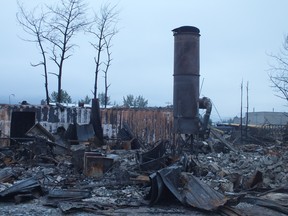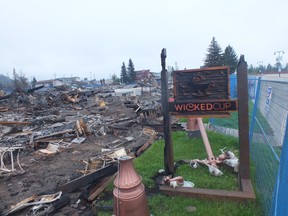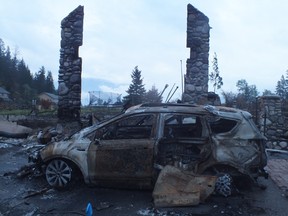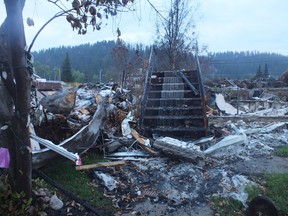Roughly 30 per cent of the Alberta mountain town was destroyed in the wildfire. Seventy-eight-year-old David Harrop was one of the lucky ones
Article content
It was the smell that struck him most. David Harrap lived in Jasper, Alta., for 31 years. Evacuated to Edmonton for three weeks, the veteran newspaper and magazine writer, returned last Friday to his home, and what’s left of the town.
“The smell in town at the burnt end is terrible,” Harrap said. “It’s not a nice forest fire, campfire type of smell. It’s noxious, it’s sickening. It’s almost smells sweet. It smells of chemicals. It’s an awful smell. I’ve never smelled anything like it.”
Advertisement 2
Article content
When the evacuation order came to the Alberta mountain town, he stayed behind, waiting it out, waiting until the last possible moment before it was time to go.
Now, with the fire officially no longer out of control, with residents allowed to return home, there are going to be plenty of questions about how Parks Canada managed the park, whether there should’ve been major firebreaks or whether the decimation caused by the mountain pine beetle created the perfect conditions for a devastating forest fire.
“There’ll be a lot of finger pointing and controversy and this and that, and people won’t want to hear it, or some will,” said Harrap, who’s fairly sure firebreaks could have made a difference.
Luckily, his home and his possessions survived, and were not among the roughly 30 per cent of Jasper that was consumed in the blaze. Harrap, who hiked atop a nearby hill to survey the damage and biked around the charred remains of his community, spoke to the National Post over the weekend.
This interview has been condensed and edited for clarity.

Q. What was it like being one of the last people in Jasper?
Article content
Advertisement 3
Article content
It wasn’t something I decided on the spur of the moment. I always thought, I’m going to leave when I’m ready to leave. I’m not going to leave because I’m told to. I can look after myself. But I felt that if my life is going to burn to the ground, I’m 78 years old, I’m going to be there when it happens, close to it when it happens.
But then on Wednesday, I couldn’t believe what I saw. This monstrous cloud racing up Whistler’s Creek towards where the ski hill is, and towards where the skytram is. I figured it was time to leave Dodge. I was actually baking bread at the time. So, my son phones me and he said, ‘Dad, you got to leave.’ And I said, ‘Well, I’m putting a loaf of bread in the oven,’ and he says ‘you gotta leave.’ I put the half-baked loaf of bread in the freezer. And, you know, we took off.
You pick up the most stupid things. I did pick up a silver egg cup and a silver spoon that I got when I was Christened in 1945.
Q. What was it like when you came back?
During the three weeks the fire was still out of control. My apartment building is 30 yards from the forest here. So, I was worried about that and then, later, I was worried that maybe the sprinklers might have been triggered in the building and I’d come back to a soggy mess.
Advertisement 4
Article content
I knew the building was safe when we were driving back yesterday (last Friday), but I didn’t know if there was any water or smoke damage.
The smell in town at the burnt end is terrible.
It was very heavy rain coming in, and then it lessened off as we came closer to Jasper. But it was low cloud, extremely depressing. I mean, it was the perfect picture for an event such as we’ve just had — it looked awful. There were police making sure people that were coming into town were residents.
We actually drove around the west part of town before I came to my apartment. You have to see it to believe it.
Amazingly, grass was already coming up through the burnt ground, some two or three inches high. So in three weeks, it was already up and running.
It’s a natural occurrence, and of course, it regenerates the forest. But of course, when it burns people’s homes and their possessions and their memories associated with those possessions, it doesn’t come back.
The smell, the silence and stuff already growing and, of course, combined with the completely destroyed. It’s just incredible.
When you see it, it’s staggering, the destruction, nothing could survive.
Advertisement 5
Article content
I have a very good friend in Cabin Creek and I was always over there, they’d invited me for meals all the time. And I looked down on the hill and I couldn’t really figure where their house had been… because all the landmarks have gone.

Q. Were there other people there?
A lot of people came, saw and left, understandably, because the west end, even if the houses aren’t destroyed, they’re not up and running. And the smell that would put you off if you had a place there. The streets were almost deserted.
The silence sort of added to the bittersweet for me. The bittersweet moment of being back. Sweet because, OK, my place is still standing, nothing’s destroyed. But the bitterness is, how come I got all my stuff and all my friends and everybody else that lost their stuff, have nothing?
Q. Have animals come back into town?
We saw some elk and I’ve seen a lot of their droppings. So, yeah, the animals are ticking along. Of course, I feel bad for the little ones like the squirrels, because even if they survive, all the grub’s gone, you know, there’s no fir cones.
Another thing that I found, well, stunning was on the skyline, on the tops of hills, it almost looks like how it looked in World War One, the mud in the Somme and all that, (with) these skeleton trees on the skyline. And another thing you can see, it’s amazing, you now have views that you never had before, because all the houses are gone, and now you can see stuff you never saw before.
Advertisement 6
Article content

Q. What has it been like emotionally?
I was on, like everybody, an emotional roller-coaster. One minute you’re OK, and the next minute you got tears in your eyes. It’s such a stunning event and I’ve never experienced that in my life before.
I got a lot of emails from people that knew I lived here for all this, people that normally wouldn’t have corresponded with me saying at least you’re safe. All I can say to that is, yeah, you are safe. But, if you weren’t safe, you’d be dead, not suffering, right?
But you know, the fact that you are safe doesn’t necessarily make it any easier, because — I know they’re only possessions, right? But we’re not talking about electronics, particularly, or a new fridge or a stove, or Ikea furniture, but I mean possessions that people have had handed down.
I left all my pictures in the storage room here in the apartment building, and I was worried because there’s sprinklers right over it, you know. And so these are photographs that go back to when my mom was alive and she died in ’79 so, yeah, you’re safe, but it doesn’t really make it any easier to cope with.
Recommended from Editorial
Our website is the place for the latest breaking news, exclusive scoops, longreads and provocative commentary. Please bookmark nationalpost.com and sign up for our newsletters here.
Article content









